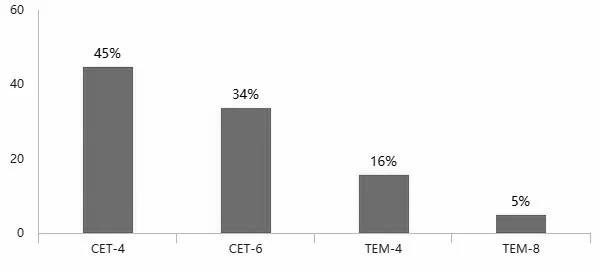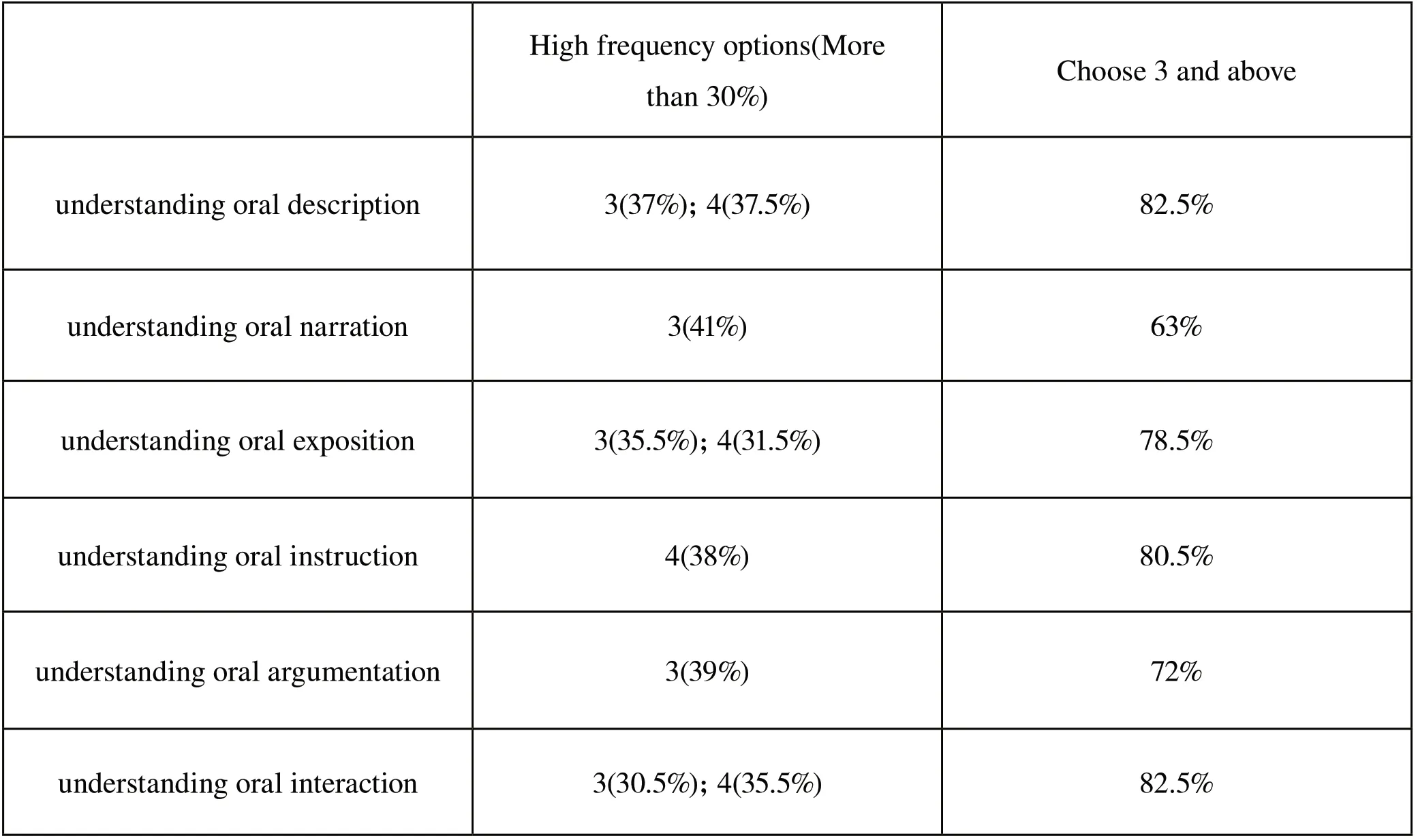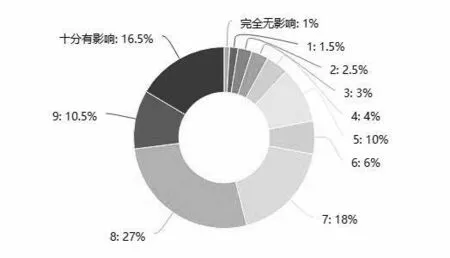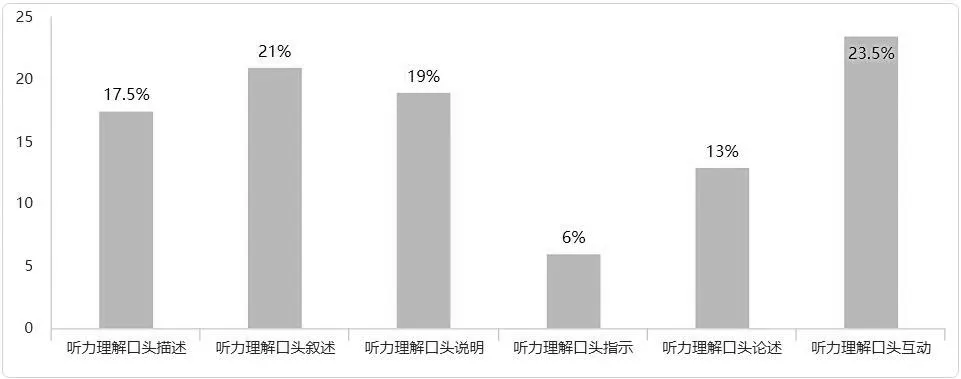A Probing into What Extent Listening Comprehension Ability Influences on Chinese English Learners
2023-01-16ZhouYihan
Zhou Yihan
School of Foreign Languages, Jiangsu University of Science and Technology, Zhenjiang, China
Email: irisyi11@qq.com
Zeng Jingting
School of Foreign Languages, Jiangsu University of Science and Technology, Zhenjiang, China
Email: jtzeng@just.edu.cn
[Abstract] The newly released China’s Standards of English Language Ability (CSE) in 2018 classifies and grades various English abilities. This paper explores to what extent listening comprehension ability influences on C hinese English learners through listening comprehension ability as defined by the CSE. The paper uses qualitative research as the main research method and quantitative research as a supplementary research method, using questionnaires and interviews to explore this research question. It concludes that listening comprehension has a significant impact on English learners in China, especially in terms of oral interaction.
[Keywords] Listening comprehension ability; China’s Standards of English Language Ability; English learners; Qualitative research.
INTRODUCTION
With the popularization of the foreign language communicative teaching method, the research on individual differences of learners has attracted more and more attention (Skehan, 2003, p. 3). Comprehension ability is undoubtedly one of the more important factors that are difficult to grasp accurately, and the issue of the relationship between it and English learning has also been debated.
As specified in the China’s Standards of English Language Ability (CSE), listening comprehension ability, as a comprehensive cognitive competence, comprises the competence of identification, extraction, summarization, analysis, critique and assessment. In September 2014, the State Council promulgated the Opinions on the Implementation Opinions of the State Council on Deepening the Reform on the Examination and Enrollment System (Liu, 2017, p. 2), which clearly stated that the construction of the foreign language proficiency assessment system should be strengthened.
The China Standards of English (CSE) is the first English proficiency standard for Chinese learners, which was approved by the Validation Committee of the State Language Commission’s Linguistic Standards for Language and Composition, and officially released by the Ministry of Education of the People’s Republic of China and National Language Commission of the People’s Republic of China on April 12, 2018. As the Language standard of the National Language Working Committee has been officially implemented since June 1, 2018. Min and He (2016), Min, He and Roland (2018) demonstrate the feasibility of the IRT vertical equivalence model for constructing the vertical equivalence “Scale” of Chinese English listening ability, and validate the quality of the “Scale” listening descriptors on a larger scale based on this model.
RESEARCH METHODOLOGY
Research questions
1. How does listening comprehension ability affect Chinese English learners?
2. How much does listening comprehension ability affect Chinese English learners?
3. Which aspects in listening comprehension ability has the greatest impact on Chinese English learners?
Participant
This paper uses a questionnaire survey. The research object is 200 randomly selected English learners of different ages on the Internet, of which 25% are English majors and 75% are non-English majors. Among the research subjects, 89% had college degree or above, and 98% were over 18 years old. Considering the long-term Chinese English test-taking education, students’English listening comprehension ability is generally weak. The questionnaire of this study is designed based on the latest China’s Standards of English Language Ability (CSE) issued in 2018. The purpose is to use SPSS quantitative analysis and interview qualitative analysis. Comprehensively test the students’current English level and English listening comprehension ability in order to analyze the impact of listening comprehension ability on English level. With regard to the ability of English learners, there is currently no clear measurement standard, so this paper uses the passing rate of CET-4 and CET-6 of non-English majors and TEM-4 and TEM-8 of English majors as a measure of English learners’ability.
Research Design
The data of this survey includes quantitative data and qualitative data. In order to explore what extent listening comprehension ability influences on Chinese English learners, this paper used questionnaire “Testing Questionnaire on the Effects of Listening Comprehension ability on English Learners”. A total of 200 questionnaires were distributed, and 200 valid questionnaires were withdrawn. Finally, the paper uses data analysis software SPSS19.0 for data analysis.
Qualitative data is mainly collected from the interview content of 6 participants randomly selected from the questionnaire (3 English major students and 3 non-English major students were selected as interviewers in this interview. 5 of them are undergraduates or above, one is undergraduate degree). The author saved the interviewee’s answer in the form of text. Qualitative data can make up for the lack of quantitative data, and can also specifically reflect the impact of English learners’listening comprehension on Chinese English learners.
Interview outline
Question 1: How do you understand listening comprehension ability?
Question 2: After reading the division of listening comprehension ability in the China’s Standards of English Language Ability, what level do you think your listening comprehension ability is?
Question 3: Does listening comprehension ability have an impact on your English learning? In what way?
Question 4: In your future study or work, will improving your English listening comprehension ability help you a lot?
The questionnaire was divided into three sections, the first of which was aimed at understanding the participants’basic English language capacity and level. The second part is about six aspects of listening comprehension ability, which aims to fully understand the participants’specific listening comprehension ability. The third part is the impact part, which aims to use the questions to gain participants’direct insight into what extent to listening comprehension ability influences on English learners.
First, the author chose the China’s Standards of English Language Ability released on 12 February, 2018 as the standard for listening comprehension ability, and organized all participants to complete the questionnaire. The English ability of Chinese learners and users of English is defined by three stages: elementary stage, intermediate stage and advanced stage. Their English ability is further divided into nine levels, with every three levels corresponding to one stage.
Secondly, the author obtained the participants’English level from the questionnaire as follows:

Figure 1: the participants’English level from the questionnaire
According to the description of listening comprehension ability in the China’s Standards of English Language Ability, the scale refines listening comprehension ability into six aspects, namely understanding oral description, understanding oral narration, understanding oral exposition, understanding oral instruction, understanding oral argumentation and understanding oral interaction. Each of these aspects is divided into 9 levels. Here, the author chooses the middle level description of the fifth level to make a proposition, and designs a questionnaire to investigate the listening comprehension ability of the participants.
ANALYSIS AND DISCUSSION
Result and discussion
CSE classifies the English language ability of Chinese English learners into nine levels. Levels 1 to 2 correspond to elementary school level, level 3 corresponds to junior high school, level 4 corresponds to high school, level 5 and 6 correspond to university, level 7 corresponds to English major, and level 8 to 9 corresponds to high-end foreign language talents.
Since the first part of the questionnaire has already been described in the Participant part, the following analysis will focus on the second and third parts of the questionnaire. Partly. The second part is the scale questions, followed by a brief description of the results of the second part of the questionnaire.
Questions 6 to 11 are descriptions of various aspects of listening comprehension ability. Combining the results of the six questions, we can draw:

Table 1: the results of questionnaire
The authors compared the six questions horizontally and found that most people chose 3 and 4. (More than thirty percent of those who chose it).
After also counting the number of people who chose 3 or more choices per question, the authors compared six aspects longitudinally. Among the two, understanding oral narration and understanding oral argumentation, those who choose 3 or above are the least. Both understanding oral description and understanding oral interaction were selected by 82.5% of people with 3 or above.
Since the question of the extent of influence is subjective and difficult to define, this questionnaire took the form of direct inquiry to reflect the results of this aspect.
The results show that more than 88% of the participants think that listening comprehension ability has an influence on English learning of more than 5 points, 16.5% of them think it is very influential (10 points), 1% think it has no effect at all, and 54% think that the extent of influence is 8 points above. From this we can be sure that most people recognize the impact of listening comprehension ability on English learning. And most people think that listening comprehension ability has a great influence on English learning, and almost half of people think that the impact is more than eight points.

Figure 2: Result of questionaire
Question 13 asks about the impact of the six aspects of CSE on listening comprehension ability on English learners. The results are as follows:

Figure 3: result of question 13 of questionaire
It can be seen from the table below that, except for the listening understanding oral instruction and understanding oral argumentation, which have a relatively low degree of influence, the other four items do not differ much. Most of them believe that verbal interaction has the greatest impact.
The Analysis of Interviews
The first question is mainly to discuss each interviewee’s understanding of the concept of listening comprehension ability. It can be seen that the six interviewees have different opinions, but most of their opinions are similar. They generally believe that listening comprehension ability is a combination of listening and understanding, and is also an important part of input. And every interviewee agrees with the importance of listening comprehension ability.
Through interviews, we can find that these six interviewees are completely ignorant of the CSE implemented in 2018. Half of the interviewers selected this interviews were English majors, but after reading the description of the CSE, their assessment of their listening comprehension ability was not very high. The average listening comprehension ability of the six interviewees is about level 4. For example, the second and third interviewees are English undergraduates, but they all think that their listening comprehension ability level is only three. And the ability level envisaged in the CSE corresponds to the English major students should be level 7. Therefore, it can be seen that the current level of listening comprehension ability under education in my country is still not as high as the overall level requires. In other words, the listening comprehension ability of English learners in my country is generally low, which is a problem that needs to be solved and improved.
Previously, the questionnaire has involved the investigation of the influence of English learners on listening comprehension, so in this interview, we will continue to ask questions about the impact (Question 3). The six interviewees also answered this question separately. They mainly explained from three perspectives: life; work and study. Three of the six interviewees need to continue to use English as a communication tool in their current work or study, and they are also sure that listening comprehension has a great impact on their work and study. Some of them are engaged in foreign trade, and they need to constantly improve their listening comprehension to improve their communication with customers. There are also interviewees studying abroad who need to use English as a learning and communication tool. In her view, listening comprehension ability occupies an important position in her study life, if not improved, it will become a stumbling block in her learning path. Some interviewees mentioned that in previous studies, poor listening comprehension ability will affect their test scores and enthusiasm for learning. Therefore, it can be concluded that listening comprehension has a great impact on English learners, mainly reflecting learning, life and work. Therefore, English learners in our country should further improve their English by continuously improving their listening comprehension ability.
The last question is a bit repetitive with the previous question. It examines the future development of English learners’listening comprehension ability. As can be seen from the respondents’answers, the answers vary from person to person. They generally think that listening comprehension ability is very important, but some interviewees think that they do not need to use English in life and work in the future, so they feel that improving English listening comprehension ability is not helpful to them. However, in the future, those who need to use English will be sure that improving listening comprehension will help them a lot. Five of the six interviewees this time believed that understanding oral interaction in listening comprehension ability was the most important to them. One person thinks that understanding oral argumentation is more important because her future academic career needs to use it frequently. Therefore, we can conclude that oral listening is relatively more important for English learners.
CONCLUSION AND IMPLICATIONS
According to the research results, author concludes that English learners in my country generally affirm the importance of listening comprehension ability. At the same time, they think that listening comprehension has a great impact on them, especially in the aspect of oral interaction in listening comprehension ability. And listening comprehension ability has a great influence on Chinese learners’study, work and life. Therefore, we can conclude that listening comprehension is very important for English learners in our country.
At the same time, the author also hopes that English learners in our country can pay more attention to this listening understanding ability. After all, listening is an important input link in English learning. It is also hoped that our country’s future education can pay attention to the training and cultivation of listening comprehension ability, and increase the proportion of listening in the examination content to stimulate English learners’attention to listening ability.
杂志排行
Proceedings of Northeast Asia International Symposium on Linguistics,Literature and Teaching的其它文章
- A Comparative Study of the Phonology and Phonetics of Chinese and German Vowels
- Deconstructive Analysis of New Media Communication from Translanguaging Perspective
- Exploration to the Application of In-person + On-line Blending Teaching Method to College English Teaching in Translation Based on Group Discussion
- Exploring Linguistic Landscape of the Qianzhou Ancient Town in Xiangxi through Ecological Linguistics
- Teaching Practice and Research of Scientific and Technical French Translation Based on Production-Oriented Approach
- A NEW“5W+1”COMMUNICATION MODEL TO TRANSLATE CHINESE KEYWORDS TO ENHANCE INTERNATIONAL COMMUNICATION
